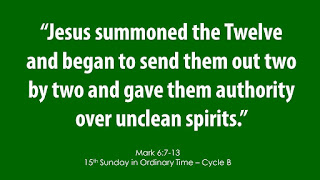Holy Gospel of Jesus Christ according to Saint John 6:1-15.
Jesus went across the Sea of Galilee.
A large crowd followed him,
because they saw the signs he was performing on the sick.
Jesus went up on the mountain,
and there he sat down with his disciples.
The Jewish feast of Passover was near.
When Jesus raised his eyes
and saw that a large crowd was coming to him,
he said to Philip,
"Where can we buy enough food for them to eat?"
He said this to test him,
because he himself knew what he was going to do.
Philip answered him,
"Two hundred days' wages worth of food would not be enough
for each of them to have a little."
One of his disciples,
Andrew, the brother of Simon Peter, said to him,
"There is a boy here who has five barley loaves and two fish;
but what good are these for so many?"
Jesus said, "Have the people recline."
Now there was a great deal of grass in that place.
So the men reclined, about five thousand in number.
Then Jesus took the loaves, gave thanks,
and distributed them to those who were reclining,
and also as much of the fish as they wanted.
When they had had their fill, he said to his disciples,
"Gather the fragments left over,
so that nothing will be wasted."
So they collected them,
and filled twelve wicker baskets with fragments
from the five barley loaves
that had been more than they could eat.
When the people saw the sign he had done, they said,
"This is truly the Prophet, the one who is to come into the world."
Since Jesus knew that they were going to come and carry him off
to make him king,
he withdrew again to the mountain alone.
A large crowd followed him,
because they saw the signs he was performing on the sick.
Jesus went up on the mountain,
and there he sat down with his disciples.
The Jewish feast of Passover was near.
When Jesus raised his eyes
and saw that a large crowd was coming to him,
he said to Philip,
"Where can we buy enough food for them to eat?"
He said this to test him,
because he himself knew what he was going to do.
Philip answered him,
"Two hundred days' wages worth of food would not be enough
for each of them to have a little."
One of his disciples,
Andrew, the brother of Simon Peter, said to him,
"There is a boy here who has five barley loaves and two fish;
but what good are these for so many?"
Jesus said, "Have the people recline."
Now there was a great deal of grass in that place.
So the men reclined, about five thousand in number.
Then Jesus took the loaves, gave thanks,
and distributed them to those who were reclining,
and also as much of the fish as they wanted.
When they had had their fill, he said to his disciples,
"Gather the fragments left over,
so that nothing will be wasted."
So they collected them,
and filled twelve wicker baskets with fragments
from the five barley loaves
that had been more than they could eat.
When the people saw the sign he had done, they said,
"This is truly the Prophet, the one who is to come into the world."
Since Jesus knew that they were going to come and carry him off
to make him king,
he withdrew again to the mountain alone.
---
Numbers run the risk of limiting value. This beautiful episode from John is a parable of the great things that Jesus can do with the little good that we can offer. Numbers pepper the story, detailing the need and urgency of the moment. Jesus, who knew the need but also has the situation in control, have to remind his disciples that faith goes beyond numbers.
It may be a story of generosity, or a story of how God can multiply what we offer but it is also a reminder that Jesus as the Prophet promised of old has more than enough to meet our needs. When Jesus feeds, He feeds to the full. He is not one who magically multiplies food, but in the same way that he takes, gives thanks, and distributes food in the Eucharistic Meal, He gives Himself as the Sign of God’s love.
People who saw the numbers saw the prophet who could do wonders but mistook the message. We who see the Sign, received and believed, sees Jesus the God-man who gives Himself that we may want for nothing. He exceeds in value to what we can count in numbers. Jesus does not work with numbers, He works in self-giving.
It may be a story of generosity, or a story of how God can multiply what we offer but it is also a reminder that Jesus as the Prophet promised of old has more than enough to meet our needs. When Jesus feeds, He feeds to the full. He is not one who magically multiplies food, but in the same way that he takes, gives thanks, and distributes food in the Eucharistic Meal, He gives Himself as the Sign of God’s love.
People who saw the numbers saw the prophet who could do wonders but mistook the message. We who see the Sign, received and believed, sees Jesus the God-man who gives Himself that we may want for nothing. He exceeds in value to what we can count in numbers. Jesus does not work with numbers, He works in self-giving.



